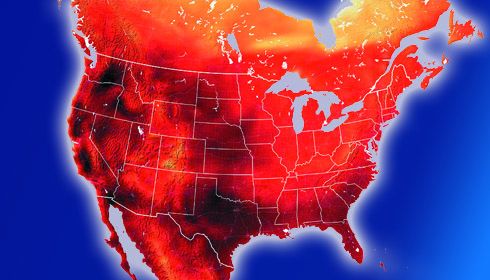
Heatwave in US: UTSE experts ask people to remain cautious
As the United States reels under an exceptionally scorching summer, the experts at UT Southwestern Medical Centre are cautioning about the severe health risks associated with prolonged exposure to extreme heat. The United States Environmental Protection Agency acknowledges that heat is the most prevalent weather-related cause of death in the US. This reality is becoming more apparent as we enter another sweltering season. Extreme heat is defined as temperatures exceeding 90 degrees Fahrenheit and Major health problems can result from excessive humidity, which is frequently present. Dr Craig Crandall, Professor of Internal Medicine in the Division of Cardiology at UT Southwestern asserts that humidity can exacerbate the situation. We keep cool by evaporating sweat from our epidermis. In humid conditions, excessive perspiration is equivalent to dehydration because sweat does not evaporate as effectively.
Heat stress affects nearly every organ in the body and, in severe cases, can lead to organ failure. Dr. Crandall asserts that it is difficult to pinpoint an organ unaffected by the weather. Blood rushes to the epidermis to release body heat, which is particularly hazardous for individuals with cardiovascular illnesses, causing the heart to work harder. Blood vessels contract to supply the epidermis with blood, potentially depriving critical organs of oxygen. "There have been cases where we see an ischemic reaction, which means inadequate blood flow to the liver or kidneys that can affect their function," according to Dr. Crandall. Overheating makes the digestive system more permeable, allowing hazardous chemicals to enter the circulation. Rhabdomyolysis, a condition in which muscle tissue degrades and releases harmful compounds into the circulation, which can result from overexertion in excessive heat, muscle tension, and cramps. Jay Pandya, M.D., Assistant Instructor of Emergency Medicine at UT Southwestern, elucidates that the release of electrolytes and proteins into the bloodstream as muscle tissue Diets can result in cardiac arrhythmias and kidney injuries in significant quantities. Dehydration and reduced blood flow, which impact kidney function, elevate the risk for individuals with renal disease. Overheating in hot and humid weather can exacerbate asthma symptoms by placing additional strain on the airways.
The summer of 2023 was the warmest on record in the United States, with approximately 120,000 emergency department visits for heat illness, according to the Centres for Disease Control and Prevention (CDC). The significant increase in heat-related mortality over the past three years underscores the critical need for awareness and prevention. Kurt Kleinschmidt, M.D., a Professor of Emergency Medicine at UT Southwestern asserts that heat exhaustion is unlikely to result in substantial harm if treated promptly. He alsoemphasises that cooling, rest, and water can aid in recovery at home. "In contrast, heat stroke is significantly more dangerous." By that time, the body's temperature has reached such a high level that the brain and other organs begin to close down. Without prompt treatment, heat exhaustion may progress to heat stroke.
Symptoms of heat exhaustion include irritability, excessive perspiration, increased body temperature, reduced urine and thirst, weakness, vertigo, and headache. In contrast, heat stroke is characterised by neurologic symptoms such as agitation, confusion, psychosis, impaired speech, and seizures. "One of the clearest indicators of heat stroke is a person's mental status." according to the medical professional. Heat stroke can be fatal when the body temperature reaches 104 degrees Fahrenheit, which is why immediate intervention to chill the body is essential.
Older people, infants, and pregnant women are more susceptible to high temperatures. Chronic illnesses or age-related consequences may have a negative impact on seniors' health. "It is partially due to a diminished sweating function," Dr. Crandall observes. The inability of children to regulate their body temperature and their increased outdoor time may elevate their risk. Due to modifications in metabolic demands and vascular flow, pregnant individuals are more susceptible to heat. Medication can also impair the body's ability to regulate temperature. Anticholinergic drugs, such as diphenhydramine (Benadryl) can decrease perspiration. However, hypertension medications can lower blood pressure or function as diuretics, which can exacerbate the effects of heat.
UT Southwestern experts suggest a variety of precautions to mitigate the risks associated with extreme temperatures. It is imperative to maintain proper hydration. Take water with you when you venture outdoors, and if you engage in a significant amount of physical activity, consider consuming electrolyte beverages. When overheated or fatigued, it is crucial to take breaks in air-conditioned or sheltered environments. Monitoring the heat index can prevent overexposure during high heat hours, and wearing lightweight, breathable clothing encourages perspiration. Wet clothes may be more effective than blowers for cooling down, particularly when temperatures exceed 100 degrees Fahrenheit. We monitor susceptible individuals to ensure they have access to cooling and are safe, allowing the body to gradually acclimatise to higher temperatures.
As temperatures rise, awareness and preventive measures are required to prevent heat-related diseases and fatalities. Dr. Pandya underscores that heat illness is a public health concern that necessitates education and action on the ground.